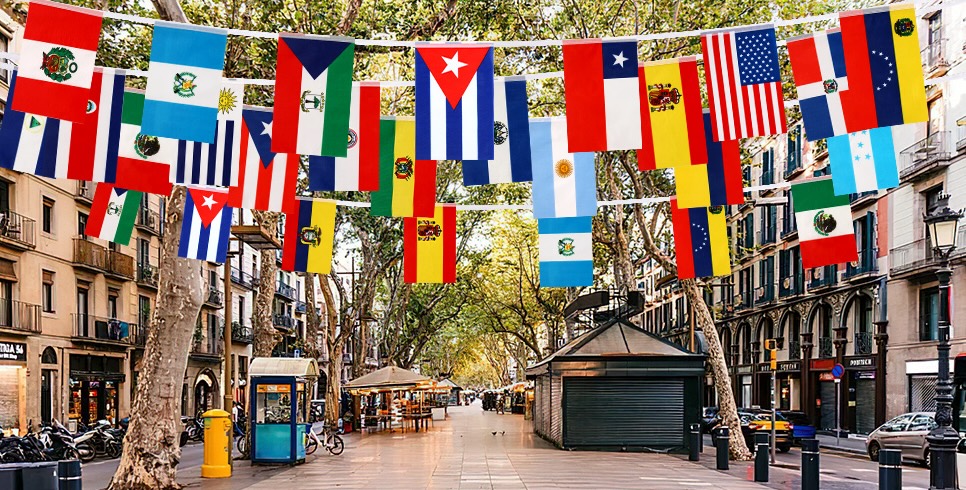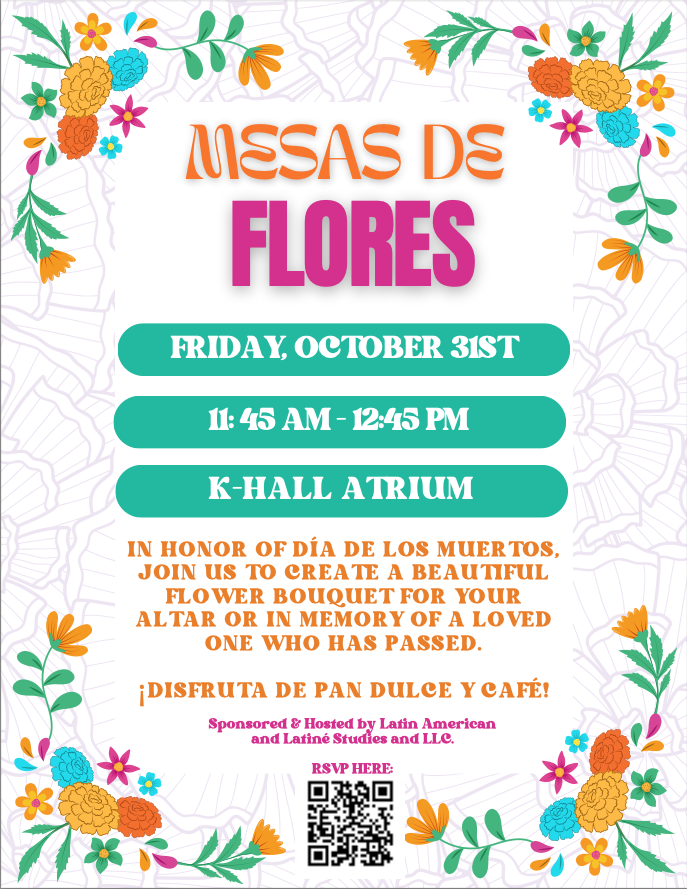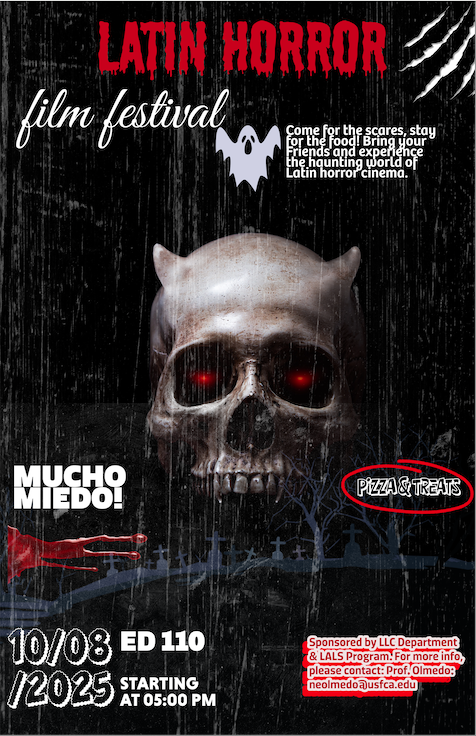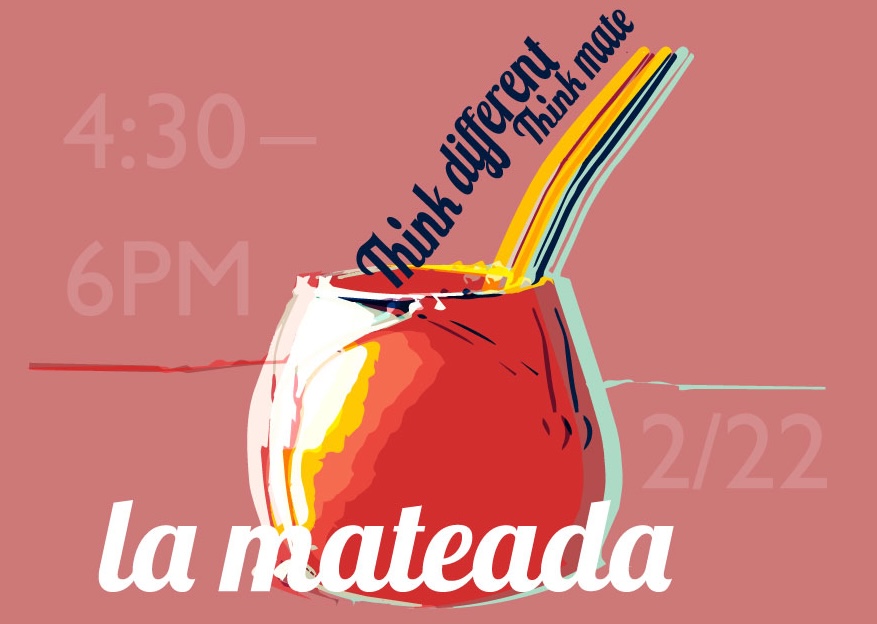Spanish Studies

Unlock endless opportunities by studying Spanish! As the second most spoken language in the world, mastering Spanish opens doors to a global network of over 500 million people. Bilingual professionals have a competitive edge, with job prospects in fields like business, healthcare, education, technology, climate change and international relations. In fact, bilingual employees can earn up to 20% more than their monolingual counterparts. Beyond career growth, learning Spanish connects you to rich, diverse cultures, giving you the skills to thrive in today’s interconnected world. Don't just learn a language—gain a lifelong advantage!

Every fall, in honor of El Día de Los Muertos, the Languages, Literatures and Cultures Department along with the Latin American Studies Program, puts on the Mesas de Flores. This event provides students with the opportunity to enjoy traditional Pan de Muerto while making their very own bouquets to place on their altars at home. We also like to add some flowers to the ofrenda in Kalmanovitz Hall Atrium to honor the loved ones remembered by our community.
Please join us in this celebration of Mexican and Latin American culture!

Every fall, USF hosts a horror film event featuring gothic monsters from the Caribbean to the Andes, marking a resurgence of horror cinema after years of censorship and silence under dictatorship.This event showcases a selection of short and feature films by young, independent filmmakers who challenge mainstream industry norms.

"El Mate"(pronounced “MAH-teh”) is a traditional South American beverage with deep cultural significance, particularly in countries such as Argentina, Uruguay, Paraguay, and southern Brazil. Every spring we gather to learn its cultural significance since Mate is more than just a beverage; it is a social ritual that embodies friendship and community.
International Focus
Spanish Studies at USF participates in the Virtual Dual Immersion program (VDI) within the Association of Jesuit Universities in Latin America (AUSJAL) and the Association of Jesuit Colleges and Universities in the U.S. (AJCU). In the VDI program, students participate in synchronous language exchanges made by video call, half in English and half in Spanish. The AUSJAL/AJCU Virtual Dual Immersion (VDI) Program maximizes the strengths of the Jesuit educational mission and its network to establish sustainable partnerships across borders, languages, and cultural divides by improving cross-cultural awareness, increasing communication skills, and building international solidarity.
Useful Resources
Minor Requirements (20 units)
Lower-division (8 units)
- SPAN 201 - Third Semester Spanish
- SPAN 202 - Fourth Semester Spanish
- or
- SPAN 221 - Span for Bilingual Students I
- SPAN 222 - Español para Bilingües II
To continue with the next level of any language course, or even to enter Upper Division after Fourth Semester, students must receive a final grade of 70% or higher.
Upper-division (12 units)
Literary and Cultural Studies (2 courses)
- SPAN 331 - Intro al Análisis Literario
- SPAN 333 - Mujer Disidente: Cine/Ficción
- SPAN 335 - Lit Latinoamericana en el Cine
- SPAN 336 - Teoría y Discurso Feminista
- SPAN 337 - Honor/Honra Siglo de Oro
- SPAN 338 - La Invención de España
- SPAN 340 - Fotografía y Ficción en L.A.
- SPAN 346 - El Mal en la Literatura
- SPAN 352 - La Guerra Civil Reinventada
- SPAN 355 - España Hoy
Electives (1 course)
- SPAN 206 - Intersecciones Culturales
- SPAN 218 - Español para negocios/finanzas
- SPAN 219 - Conversación en Español
- SPAN 220 - Español Profesiones Médicas
- SPAN 225 - El Español en SF, CA y EEUU
- SPAN 226 - Introducción a la Traducción
- SPAN 232 - La Venganza de los Monstruos
- SPAN 255 - El Cuento Hispánico Moderno
- SPAN 272 - Sexualidad en la Lit Chicana
- SPAN 301 - Puentes con Comunidad Latina
- SPAN 312 - Fonética
- SPAN 317 - Introducción a la Lingüística
- SPAN 325 - Lengua/Cultura: Latinoamérica
- SPAN 351 - Revista Digital: DIVISADERO
- SPAN 375 - Lit. y Arte Fronteriza
- Courses taken in Study Abroad Programs (pre-approval required)
Spanish Writing Center
The Spanish Writing Center is a unique tutorial service that assists students with writing assignments in the Second Year Spanish language classes and beyond. The focus is on elements required to writing an effective essay or research paper: content, organization, language, vocabulary and mechanics. The special one-on-one contact students receive enable them to acquire the necessary writing skills to fulfill assignments and to enhance English writing skills, as well.
The Center is not a correcting or proofreading service. Students are required to actively participate during tutorial sessions with their writing tutors, which involves arriving to each session with specific questions or problem areas they wish to discuss. In addition to answering those questions, tutors will go over a sample paragraphs and give further tips and advice.
Contact Professor Perea-Rodriguez to set up an appointment (operearodriguez@usfca.edu).
Sigma Delta Pi
Founded at the University of California, Berkeley in 1919, Sigma Delta Pi, the National Collegiate Hispanic Honor Society, is a non-profit organization incorporated in the State of South Carolina and headquartered at the College of Charleston.
Per Sigma Delta Pi’s national by-laws, the Society’s purpose/mission is multi-faceted:
1. To honor those who excel in the study of the Spanish language and in the study of the literature and culture of the Spanish-speaking world;
2. To foster an understanding, appreciation and respect for the peoples, cultures and societies of the Spanish-speaking world;
3. To honor those who have promoted and reinforced a better understanding of the contributions of the Spanish-speaking world;
4. To serve its membership in support of the Society’s goals and ideals.
Modified First Year Sequence
The Modified First Year Spanish sequence is specifically designed for students with learning disabilities and/or with demonstrable long-standing difficulties learning a foreign language. This sequence includes the same overall scope and objectives as the other introductory courses but has a reduced number of linguistic functions and employs a differentiated instructional approach. If you think you may be a candidate to take these courses, please contact Professor Karyn Schell for more information and the requirements.
Non-USF Resources
Dictionaries
Grammar Assistance
Listening Comprehension
Cultural
Local Events and Organizations
- Mission Cultural Center for Latino Arts
- Precita Eyes Muralists
- Mujeres Unidas Y Activas
- Teatro Vision
Volunteer Abroad
Opportunities to Work in Spain
A number of positions as a paid language assistant are now available in Spain for US college students who are native speakers of English. These programs provide an excellent opportunity to fully immerse yourself in the language and culture of Spain, while also gaining valuable work experience as an Assistant to an English teacher in a Spanish elementary or high school.
Magazines
Newspapers
- Bolivia.com
- Ganma.cubaweb.cu
- Bbc.co.uk/mundo
- Todalaprensa.com
- Lanacion.com
- EL TIEMPO.com
- LaPrensa.hn
- Ilustración Peruana Caretas